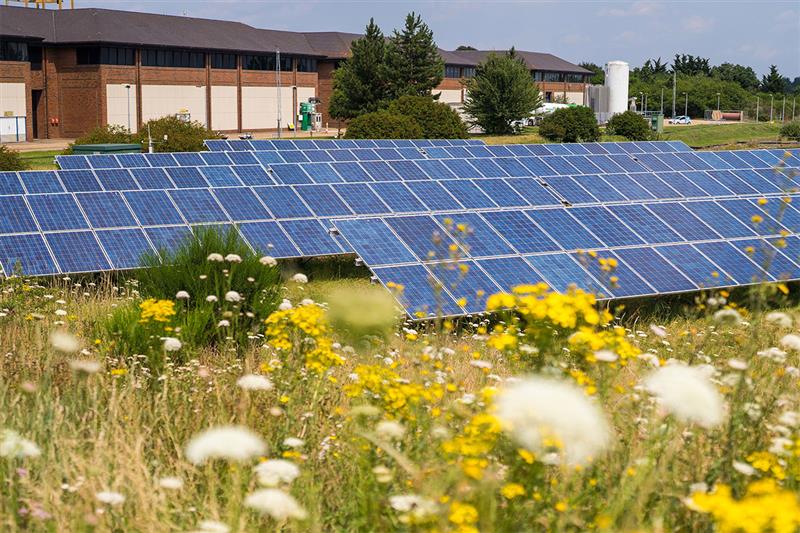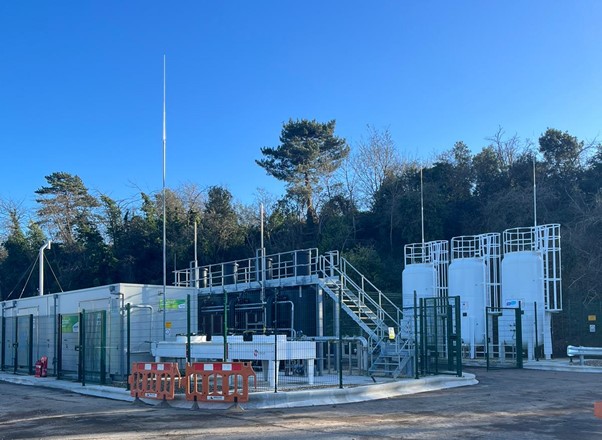Managing our carbon emissions
Climate change is one of the greatest challenges for humanity. That’s why we’re:
- Committed to reducing our greenhouse gas emissions
- Transforming the way we create and use energy.
- Helping protect our world and water supply for future generations.
Last year, our net scope one and two market-based emissions were nearly 73% lower than in 1990. During the same period our customer numbers increased by nearly four million.
We’ve achieved this drop by:
- Implementing innovative heat recovery and energy efficiency initiatives
- Reducing our use of fossil fuels
- Buying certified renewable energy to power our sites sustainable
In 2024/25 we self-generated and used 475.3GWh of renewable energy, covering 25.8% of our own energy needs.

Plans for 2030
Our plans for 2030 build on the work of the previous 10 years and include:
Generating more renewable energy
We plan to expand the generation of renewable energy.
Improving energy and fuel efficiency
We’re continually upgrading our processes to reduce the energy they use.
Reducing the use of fossil fuels
We are using low carbon fuels such as biogas and Hydrotreated Vegetable Oil (HVO) to reduce our emissions by up to 90%.
Trialing electric vehicles
We’re using electric vehicles to cut emissions and help us all breathe cleaner air.
Building a sustainable supply chain
We’re looking at how our supply chain reduces their carbon footprint to help us reduce ours.
Exploring lower carbon processes
Finding ways to treat waste and control the treatment process to reduce emissions.
Unlocking our resources
Expanding resource recovery opportunities, for example, producing biomethane from sewage sludge for injection into the gas grid.
Our carbon management journey
Since setting our carbon reduction goal in 2019, there have been significant changes which impact the net zero challenge. These include:
- Changes to our understanding of the levels of Nitrous Oxide emitted. This includes levels associated with the wastewater treatment process
- Increased operational emissions due to changes in reporting scope boundaries
- Additional carbon impacts associated with increases in treatment standards
- Government guidance to consider phasing of non-statutory commitments including Net Zero. This reflects concerns around affordability, deliverability and financeability of Price Review 2024 plans
These developments have been reflected in our AMP8 plan submitted to Ofwat. They do not change our desire to achieve Net Zero. We're reviewing our route map to understand the challenges and opportunities they present. We will publish an updated overview of our net zero goals when complete.

You can download our original plan and view examples of the progress we’re making:
- Annual Report 2024-25pdf | 10.5 MB
- Annual Performance Report 2024-25pdf | 16.2 MB
- Thames Water Annual Report 2023-24pdf | 5.7 MB
- Annual performance report 2023-24 amendmentpdf | 28.1 MB
- Thames Water Sustainability Report and ESG Statement 2023-24pdf | 4.2 MB
- Thames Water Annual Report 2022-23pdf | 7.6 MB
- Annual Performance Report 2022-23pdf | 9.3 MB
- Thames Water Sustainability Report and ESG Statement 2022-23pdf | 6.2 MB
- Our journey to net zero carbon and beyondpdf | 2.1 MB